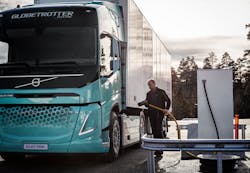Volvo Trucks develops heavy duty electric concept trucks
Volvo Trucks, having recently started sales of electric trucks for urban transport, believes that electrification can become a competitive alternative for heavier trucks. To explore and demonstrate the possibilities, Volvo Trucks has developed electric concept trucks for construction operations and regional distribution.
“We see great potential for heavy duty electric trucks for regional transport and construction in the longer term. With our concept trucks, we aim to explore and demonstrate different solutions for the future while evaluating the level of interest in the market and in society. To increase demand for electrified trucks, the charging infrastructure needs to be rapidly expanded, while stronger financial incentives must be created for haulers who act as pioneers by choosing new vehicles with a lower environmental and climate footprint,” said Roger Alm, president, Volvo Trucks.
Heavy duty electric trucks can help improve the work environment for drivers and construction workers thanks to low noise level and zero exhaust emissions during operation. The latter will have a significant and positive effect on air quality in cities with many ongoing construction projects. Due to the lack of noise disturbance, these trucks also make it possible to perform transport operations for more hours per day which opens possibilities for streamlining operations, for instance in large construction projects and for transports in and around cities.
A reduction of the overall climate impact of the transport sector is possible by using heavy electric vehicles in regional distribution. The majority of goods distribution by truck within the EU is regional.
“In Europe there is an enormous number of trucks used for regional goods transport that have an average annual mileage of 80,000 kilometers. This means that increased use of electric vehicles for regional distribution would result in significant climate gains, provided the electricity is fossil-free,” said Lars Mårtensson, director of environment and innovation, Volvo Trucks.
Volvo Trucks’ plan for electric heavy duty trucks for construction and regional distribution is to start by having selected customers in Europe pilot a small number of future electric vehicles. More extensive commercialization will follow at a later point.
“The speed of electrification will depend on a number of factors. On the one hand, an extensive expansion of the charging infrastructure is needed, and on the other hand it’s necessary to ensure that regional power networks can deliver sufficient transfer capacity in the long term. Financial incentives are necessary to induce more haulers to invest in electric vehicles. Transport buyers can also contribute by offering longer contracts and being more willing to pay for sustainable transports. Many haulage operators have very small margins, so every new investment must be profitable,” said Mårtensson.
In parallel with increased electrification of the transport sector, ongoing improvement of the efficiency of combustion engines will continue to play a key role for long haul truck transport for many years to come.
“Today’s truck engines are efficient energy converters that can run on diesel or various renewable fuels such as liquefied biogas or HVO, and the technology still has potential for further development,” said Mårtensson.
Volvo trucks with alternative fuels/drivelines include:
- Volvo FL Electric and Volvo FE Electric. Both of these trucks are all-electric and intended for local distribution and refuse handling in urban environments.
- Volvo FH LNG and Volvo FM LNG. The Volvo FH for heavy duty long-haul operations and the Volvo FM for heavy duty regional transport run on liquefied natural gas or biogas.
- Volvo FE CNG. Volvo FE for compressed natural gas or biogas is intended for local distribution and refuse handling.
